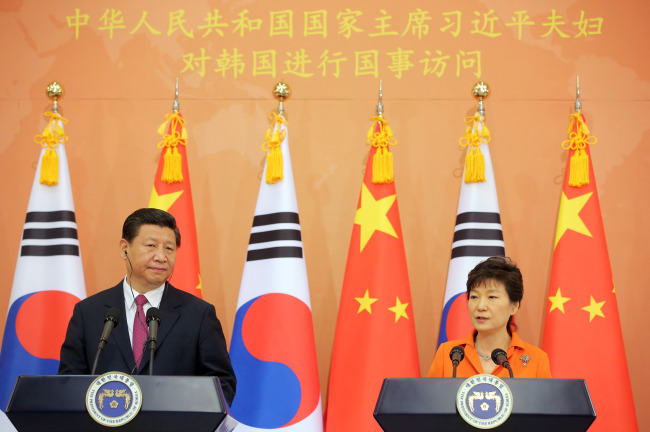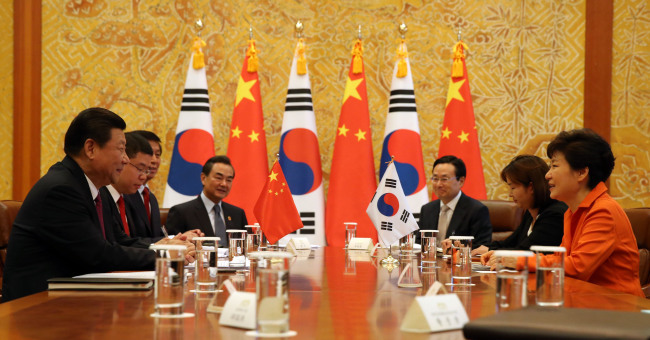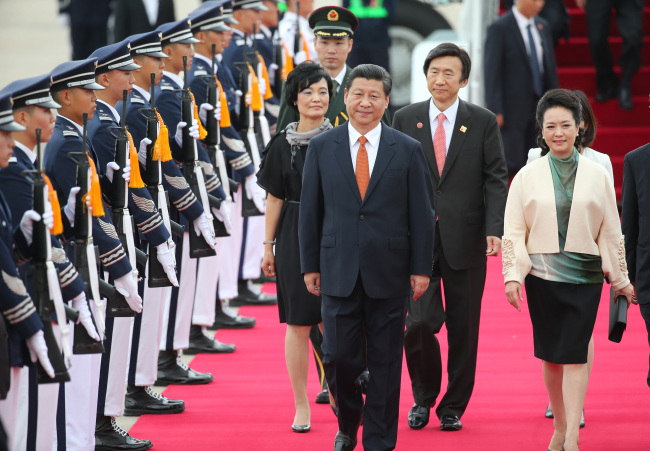The summit between the leaders of South Korea and China took the international spotlight Thursday as it proceeded amid growing volatility in a Northeast Asian security landscape beset by geostrategic rivalries and territorial antagonism.
The fluid security environment has posed a tough foreign policy challenge to Seoul, which has been striving to deepen its long-standing security alliance with the U.S., strategic partnership with China and practical cooperation with Japan.
“Given the volatile political landscape in Northeast Asia, the direction the relationship between South Korea and China goes will affect a complex web of regional relations including Sino-U.S. relations and Sino-Japan relations ― one reason why the summit drew global attention,” said Suh Jin-young, professor emeritus at Korea University.
The fluid security environment has posed a tough foreign policy challenge to Seoul, which has been striving to deepen its long-standing security alliance with the U.S., strategic partnership with China and practical cooperation with Japan.
“Given the volatile political landscape in Northeast Asia, the direction the relationship between South Korea and China goes will affect a complex web of regional relations including Sino-U.S. relations and Sino-Japan relations ― one reason why the summit drew global attention,” said Suh Jin-young, professor emeritus at Korea University.

“The good thing is that South Korea’s strategic value has been increasing amid the great-power competition. But the bad thing is the possibility that South Korea could face pressure from regional powers (to take sides).”
Presidents Park Geun-hye and Xi Jinping held their fifth summit in Seoul to discuss North Korea’s saber-rattling, ongoing negotiations on the bilateral free trade agreement and other regional and global issues.
The meeting came as Park has sought to deepen and broaden the relationship with China ― a vital partner for trade, tourism, business and efforts to denuclearize a wayward North Korea. During the previous administration, the relationship between South Korea and China faltered due to Seoul’s foreign policy focus on the U.S.
Analysts said that Seoul needs to develop a more prudent, creative external policy strategy that will help it continue to maintain practical partnerships with regional powers.
“What is needed for South Korea is practical, rational judgment that will best serve its national interests and help establish the foundation for peace and prosperity on the Korean Peninsula,” said Moon Heung-ho, the director of the Institute of Chinese Studies at Hanyang University.
“Rather than being obsessed with gaining a short-term outcome, Korea’s diplomatic strategy should be based upon a future-oriented perspective and such insights with the vision of a unified Korea in mind.”

The U.S., in particular, closely watched the summit between Park and Xi as it could impact its Asia policy, which involves strengthening its network of regional alliances to maintain stability, and the regional status quo, which could be challenged by an emergent China, analysts said.
The U.S. has long sought to deepen the three-way security cooperation with South Korea and Japan to handle North Korea’s nuclear and missile threats, and China’s increasing assertiveness, particularly regarding regional maritime disputes.
Seoul, however, has been cautious about actively joining the trilateral security collaboration as it could unnerve Beijing, which views the security partnership as aimed at China.
The U.S. also wants to bring in an advanced missile defense system, called Terminal High Altitude Area Defense, to South Korea to better handle North Korean threats, but the South remains hesitant as the system could provoke China.
Japan also carefully monitored the evolvement of the relationship between South Korea and China, as the two victims of its past militarism have moved to forge a coalition to pressure it to fully atone for its wartime misdeeds.

Seoul and Beijing have jointly criticized Tokyo, as Japan recently moved to undercut the credibility of its landmark 1993 apology for its sexual enslavement of Asian women, euphemistically called “comfort women,” during World War II.
During Thursday’s summit, the two sides agreed to cooperate in joint research and sharing of historical materials concerning the comfort women.
The two countries are also expected to jointly handle the possible ramifications from Tokyo’s decision to accept a reinterpretation of its war-renouncing Article 9 of the constitution. They fear that Japan’s pursuit of a stronger security role could be a destabilizing factor in regional security.
Meanwhile, Thursday’s summit hinted at a subtle shift in Sino-North Korea relations. Xi Jinping became the first Chinese president to visit Seoul before visiting Pyongyang. The summit marked the fifth time the two leaders met for bilateral talks.
“In the past, China thought of its relationship with South Korea as being subordinate to the Sino-North Korea relationship. But now, China is looking at its relationship with North Korea as a normal state-to-state relationship,” said Kim Heung-kyu, diplomacy professor at Ajou University.
By Song Sang-ho (sshluck@heraldcorp.com)
-
Articles by Korea Herald


![[AtoZ into Korean mind] Humor in Korea: Navigating the line between what's funny and not](http://res.heraldm.com/phpwas/restmb_idxmake.php?idx=644&simg=/content/image/2024/04/22/20240422050642_0.jpg&u=)
![[Exclusive] Korean military set to ban iPhones over 'security' concerns](http://res.heraldm.com/phpwas/restmb_idxmake.php?idx=644&simg=/content/image/2024/04/23/20240423050599_0.jpg&u=20240423183955)



![[Graphic News] 77% of young Koreans still financially dependent](http://res.heraldm.com/phpwas/restmb_idxmake.php?idx=644&simg=/content/image/2024/04/22/20240422050762_0.gif&u=)
![[Herald Interview] Why Toss invited hackers to penetrate its system](http://res.heraldm.com/phpwas/restmb_idxmake.php?idx=644&simg=/content/image/2024/04/22/20240422050569_0.jpg&u=20240422150649)






![[Exclusive] Korean military to ban iPhones over security issues](http://res.heraldm.com/phpwas/restmb_idxmake.php?idx=652&simg=/content/image/2024/04/23/20240423050599_0.jpg&u=20240423183955)



![[Today’s K-pop] Ateez confirms US tour details](http://res.heraldm.com/phpwas/restmb_idxmake.php?idx=642&simg=/content/image/2024/04/23/20240423050700_0.jpg&u=)